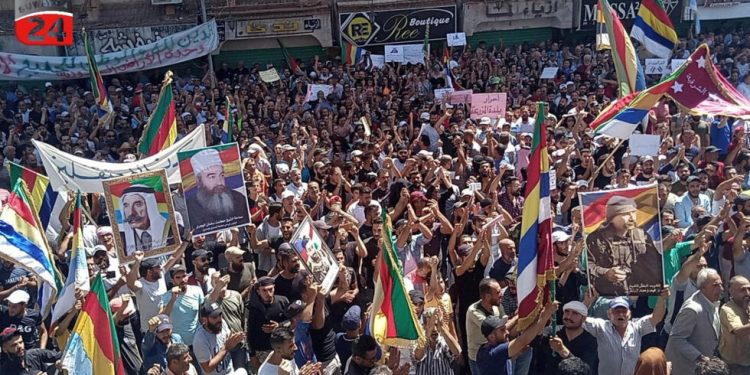Joint Statement of the International Unity of Workers – Fourth International (ITU-CI) and the Revolutionary Communist International Tendency (RCIT), 17 September 2023, https://uit-ci.org/ y www.thecommunists.net
16 September marked one month of popular protests in Syria. Protests began on 16 August in Al Suwayda, Syria because the government removed petrol and fuel oil subsidies, worsening living conditions.
The protests erupted after a 50 per cent devaluation of the currency, bringing the informal market rate to 15,000 Syrian pounds to one of the US dollars. The Syrian government removed gasoline subsidies, increasing fuel prices from 3,000 to 8,000 Syrian pounds per litre. Permanent power cuts compounded this, with their repercussions on daily life. This triggered protests that quickly took on a political dynamic of questioning the dictatorship.
The anti-cost-of-living protests began in Al Suwayda City and challenged the dictatorship of Bashar al-Assad. From there, the protests have spread to other cities and towns. Popular demonstrations have been taking place daily.
According to a new report by the well-informed Institute for the Study of War (ISW), a US think tank, protests have taken place across the country in about 8 provinces. Local media Suwayda 24 reported that protests had spread to the southern city of Daraa and the town of Jableh, near the coastal city of Latakia, along with others in opposition-held areas in the north-western city of Idlib, the capital of the province of the same name, considered the last bastion of opposition to the dictator.
However, the protests were not limited to economic issues, but quickly took on a political dimension, calling for the fall of the Assad regime. People chant famous slogans that have become popular since the beginning of the Syrian Revolution in 2011. Demonstrators also wave ‘Free Syria’ flags.
On 14 September, demonstrators gathered in a central square in Al Suwayda, shouting slogans such as “Syria wants freedom” or “Go away Bashar, the enemy of humanity“. The dictatorial government of Bashar al-Assad is cracking down to stop them. But, for now, the protests continue.
In March 2011, the Syrian people unleashed a revolutionary mobilisation with the slogan “Down with Al Assad”. It was part of the revolution that began in January in Tunisia and spread across North Africa and the Middle East, toppling old dictators. Bashar-al-Assad, supported by Putin and Russian troops, launched a genocidal repression with tanks and even bombing, massacring and destroying entire cities. Such suppression was also supported by Turkey, Iran, and the United States. Because of this, the regime could prevent its downfall despite years of civil war and heroic popular resistance.
Assad’s dictatorship caused 6.7 million Syrians to flee the country and 5.6 million to become refugees in neighbouring countries and Europe. About 90 per cent of its population lives below the poverty line. Months ago, the earthquake devastated Turkey and the rebel region of Idlib. The genocidal Al Assad put all kinds of obstacles to the free flow of international aid.
Now broad sectors of the Syrian people are once again going out to protest, taking up the banners of the revolution that began in 2011.
The IWU-FI and RCIT strongly support the Syrian people’s mass protests and their demands.
We support these protests because the Syrian people can retake the path opened in the 2011 popular revolution to end the dictatorship and self-determination by achieving their government. As revolutionary socialists, we know that the definitive solution for the working class and the people of Syria will come from the hands of a workers’ government and a socialist Syria, which respects the national and religious rights of all peoples.
From the IWU-FI and the RCIT, we call for full solidarity with the struggle of the Syrian people. They fight against economic austerity measures, freedom for prisoners, social justice and the rights of the oppressed. They fight to end Al Assad’s dictatorship, for the withdrawal of the invading imperialist powers, Russia, the United States, and regional powers such as Turkey, Iran or Israel.
We call on workers and popular organisations, as well as left parties, to join forces for an international campaign of solidarity with the struggle of the Syrian people for Bashar al Assad out and all imperialist interventions and regional powers such as Turkey, Iran and Israel!













